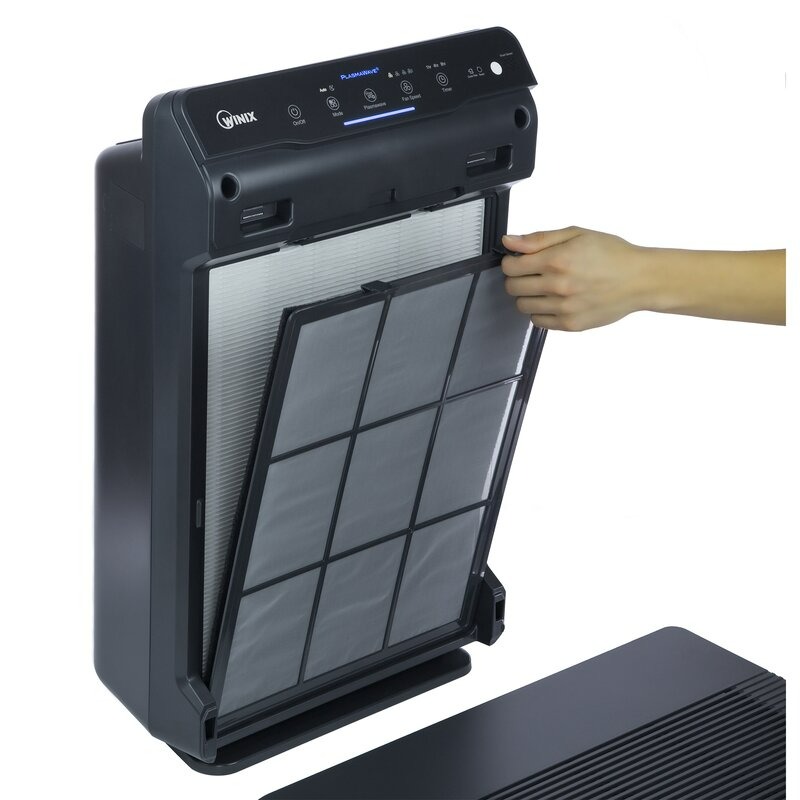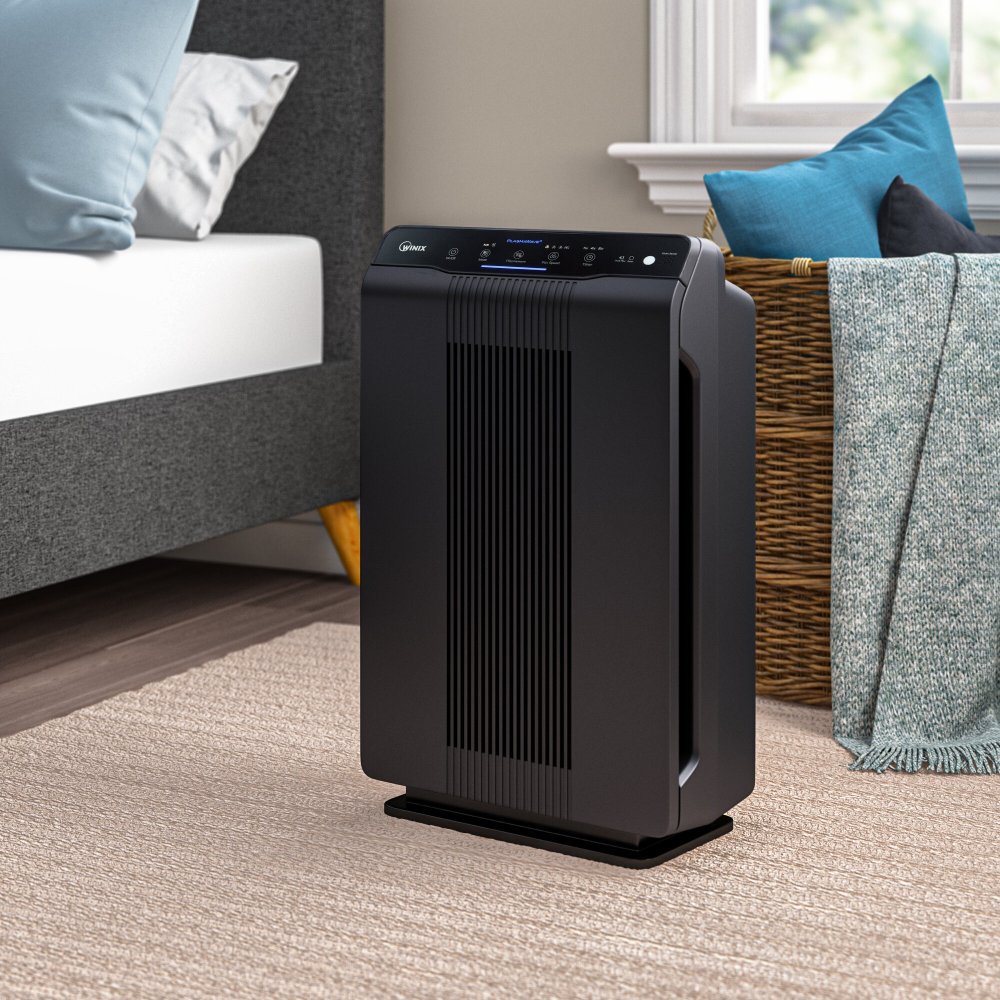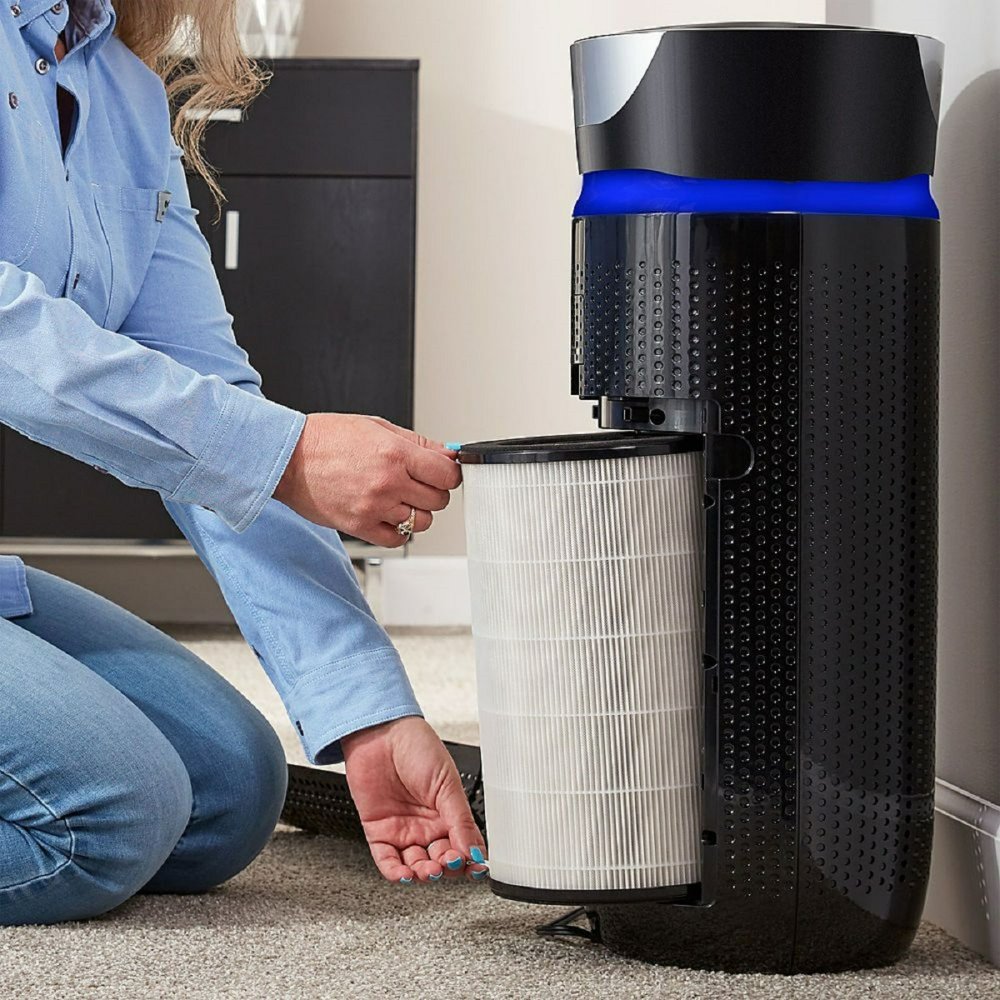Introduction to HEPA Filters and Their Role in Air Purification
HEPA filters trap tiny particles that pollute air. They catch things like dust, pollen, and smoke. These filters help make air clean and safe, especially for those with allergies or asthma. Air purifiers, vacuum cleaners, HVAC systems, and even cars use HEPA filters to improve air quality.
HEPA stands for High-Efficiency Particulate Air. For a filter to earn this name, it must filter out 99.97% of particles that are 0.3 microns. That’s about 300 times smaller than a human hair! The filters work so well because they have a dense mesh of fibers. These fibers grab the tiny particles as air passes through.
In simple terms, having a HEPA filter means cleaner air at home or work. This is important for people who care about clean air. Clean air is key for health and comfort. That’s why knowing about your air purifier’s filter, including if and how you can wash it, matters a lot.

The Composition of HEPA Filters
HEPA filters are essential for trapping harmful particles in the air. These filters consist of a complex mesh made from varied materials. Common materials include coarse glass fibers, synthetic fibers like polyester, and sometimes metallic elements. Manufacturers shape these fibers into a dense mat. This mat forms the core of every HEPA filter. Each HEPA filter includes pleated sheets. These increase the surface area, enhancing the filter’s ability to clean air. Frames of cardboard or metal hold these sheets in place. Some filters also feature a pre-filter layer. This layer catches larger particles before they reach the HEPA material. Activated carbon layers are also common. They help in removing odors and gases from the air. All these elements work together to stop pollutants as small as 0.3 microns. This includes dust, pollen, and many types of smoke.
The Application of HEPA Filters in Various Devices
HEPA filters are used widely across various devices, showcasing their versatility in improving indoor air quality. Not only are these filters integral to the functioning of air purifiers, but they are also crucial in other household and commercial equipment.
Air Purifiers
Air purifiers with HEPA filters trap harmful airborne particles. This makes indoor environments safer for everyone, especially those with respiratory issues.
Vacuum Cleaners
In vacuum cleaners, HEPA filters catch dust and allergens. This prevents these irritants from being expelled back into the room during cleaning.
HVAC Systems
HVAC systems equipped with HEPA filters circulate cleaner air throughout homes and buildings. This significantly reduces the presence of airborne pollutants.
Vehicles
Many modern cars come with HEPA filters, enhancing the air quality inside the vehicle. These filters are effective in trapping outside pollutants like exhaust fumes and pollen.
Through these applications, HEPA filters play a crucial role in not only maintaining but improving air quality across different settings. Each device utilizes the unique properties of HEPA filters to provide a cleaner, healthier environment. This wide usage underlines the importance of proper maintenance and care to ensure these filters function efficiently.

The Truth About Washing HEPA Filters
When it comes to maintaining HEPA filters, a common question arises: can you wash air purifier filters? The simple answer is: it depends. Most standard HEPA filters are not designed to be washed. Washing these filters can damage their intricate mesh of fibers, reducing their efficacy. Here’s what you need to know:
- Non-Washable Filters: Typically, HEPA filters should not come into contact with water. The fragile fibers can be damaged by washing, leading to a degraded performance. Attempting to wash non-washable HEPA filters can result in compromised air quality as damaged filters may fail to trap pollutants effectively.
- Washable Filters: Some filters are labeled ‘washable’ or ‘permanent’ by the manufacturer. These are designed to withstand gentle cleaning, but there are no standardized testing methods to verify their performance post-wash. If you have a washable filter, follow the specific instructions provided by the manufacturer to avoid damage.
- Reduced Effectiveness: Even if a HEPA filter appears undamaged after washing, the washing process can alter the consistency of the fiber weave. This change can create gaps and allow particles to bypass the filter. Thus, the filter may look clean but not function properly.
- Integrity of the Frame: The frame of the HEPA filter is as important as the fibers. If the frame or the seal is not intact, the efficacy of the filter declines. When washing a filter, you must also ensure that the frame is not damaged.
In essence, washing a HEPA filter is risky and may not be worth the potential decrease in air purifying performance. It’s critical to check your filter’s specifications before deciding to clean instead of replace it. If in doubt, it’s always safer to follow the manufacturer’s recommendations and replace the filter at appropriate intervals to ensure the air quality in your home remains high.
Potential Consequences of Cleaning HEPA Filters
When you think about cleaning a HEPA filter, there are some key things to keep in mind. Here’s why cleaning a HEPA filter isn’t always the best idea:
- Risk of Damage: Cleaning may harm the filter’s fibers. This lowers how well the filter works.
- Less Efficiency: Even a slightly damaged filter can miss particles. This means dirtier air.
- Bad Frame Seals: Washing can weaken the seal of the filter frame. Air might leak around, not through it.
- Mold Growth: A wet filter can grow mold. This is bad for your health.
- Contaminating Your Home: Cleaning a filter indoors might release trapped pollutants back into your home.
- Breathing in Pollutants: During cleaning, you might breathe in dust and allergens from the filter.
- Vacuum Hazards: Using a vacuum without a HEPA filter just spreads the dust around.
- Drying Time: Washed filters must dry fully. This takes time, and you can’t clean air without a filter.
So, should you wash HEPA filters? The safest choice is to follow what the filter’s maker says. If they say ‘washable’ or ‘permanent,’ only clean as they recommend. Otherwise, replacing is usually the way to go to keep your air clean.

Alternatives to Washing: Proper HEPA Filter Maintenance
Knowing how to maintain your HEPA filter properly is vital for its longevity and efficiency. Here are several methods to consider:
- Check the Filter Regularly: Every month, inspect your filter. Look for noticeable buildup or damage.
- Vacuum Gently: If your filter is ‘permanent’, you might be able to vacuum it. Use a low suction setting and a brush attachment.
- Replace When Needed: Follow the manufacturer’s guidelines on when to replace filters. Don’t wait too long.
- Keep Pre-Filters Clean: If your device has pre-filters, clean them according to instructions. This helps the main filter last longer.
- Avoid Moisture: Keep filters dry. Moist filters can breed mold and spread it through the air.
- Handle with Care: When inspecting or replacing the filter, handle it gently. Avoid touching the material directly.
By following these steps, you can make sure your HEPA filter continues to operate at peak performance without the risks associated with washing.
Techniques for Cleaning Washable and Permanent Filters
For those who own washable or permanent HEPA filters, proper cleaning is essential. Despite some HEPA filters being label as ‘washable’ or ‘permanent’, they require specific care to ensure they continue to function effectively. Here’s how you can clean these filters safely:
- Washable Filters: If labeled ‘washable’, rinse the filter under cold water. Avoid touching the filter material directly; let water run through it only. After rinsing, it’s crucial to allow the filter to dry completely before reinstalling it. Typically, leaving it to dry for 24 hours is advised to ensure it’s fully dry.
- Permanent Filters: For filters labeled ‘permanent’, you can clean them by carefully using a vacuum. Use a soft brush attachment and gentle suction to remove dust and particles from the surface. Avoid using water on these types of filters as it may damage the material.
Both types of filters need careful handling to avoid damage. Always follow the manufacturer’s instructions for specific cleaning guidelines. This will help maintain the filter’s ability to purify air effectively.
Other Methods to Enhance Indoor Air Quality Beyond HEPA
While HEPA filters are great for trapping particles, there are other ways to boost indoor air quality. Here are some alternative methods:
- Increase Ventilation: Open windows and doors when you can. Fresh air helps dilute indoor pollutants.
- Eliminate Sources: Remove things that cause indoor air pollution. This includes certain cleaning agents, paints, and smoke.
- Use Cooking Vents: Turn on exhaust fans while cooking. They capture smoke and cooking odors.
- Add Houseplants: Certain plants can absorb toxins from the air. They’re natural air purifiers.
- Control Humidity: Keep humidity levels low to stop mold growth. Use dehumidifiers if needed.
- Keep Clean: Dust and vacuum often. This removes particles from surfaces and the air.
- Air Cleaning Devices: Consider using devices other than HEPA filters. Ionic purifiers and activated carbon filters can help.
- No Smoking Indoors: Do not allow smoking inside. Tobacco smoke is full of harmful chemicals.
- Regular Maintenance: Clean and maintain HVAC systems. This ensures clean air circulates well.
- Non-Toxic Materials: Choose furniture and building materials that won’t release chemicals.
Implementing these steps, along with using a HEPA filter, can provide the best air quality for your home or office.
Understanding Philips Air Purifier Filters Maintenance
When maintaining your Philips air purifier, understanding the filter types is crucial. Your Philips model might have standalone or layered filters. Here’s what to remember about each:
Standalone Filters
These filters are single units within the purifier. Some, like the pre-filter, are cleanable. Use a vacuum or rinse as specified. Non-washable filters, labeled as A and B, need replacements according to the user manual.
Layered Filters
Layered filters have multiple screening levels. The surface, known as the pre-filter, can be cleaned using a vacuum. Replace deeper layers when the alert signals on your purifier’s display.
Maintenance Tips
- Check Alerts: Your purifier may alert you to clean or replace filters. Follow these alerts diligently.
- Manual Guide: Always refer to the model-specific manual for accurate cleaning and replacement instructions.
- Regular Checks: Regardless of alerts, regularly inspect your filters for any visible dirt or damage.
Consulting your user manual and respecting the designated filter maintenance schedule will keep your air purifier operating effectively.
Final Recommendations for HEPA Filter Care
When caring for your HEPA filter, keep these tips in mind:
- Do Not Wash Standard Filters: Most HEPA filters should not get wet. Check if yours is an exception.
- Follow Manufacturer’s Advice: Only clean washable or permanent filters as the maker suggests.
- Replace Filters Regularly: Change the filter when the manual says to keep air pure.
- Handle With Care: Be gentle when checking or changing your filter to avoid damage.
- Keep It Dry: Always dry a washable filter well before putting it back.
- Avoid Contamination: Clean filters outside to prevent releasing dirt back into your home.
- Look for Damage: Always look for any signs of wear or tear during regular check-ups.
By following these steps, you help ensure your air stays clean and your filter works right. Remember, proper care keeps your air purifier efficient and effective.